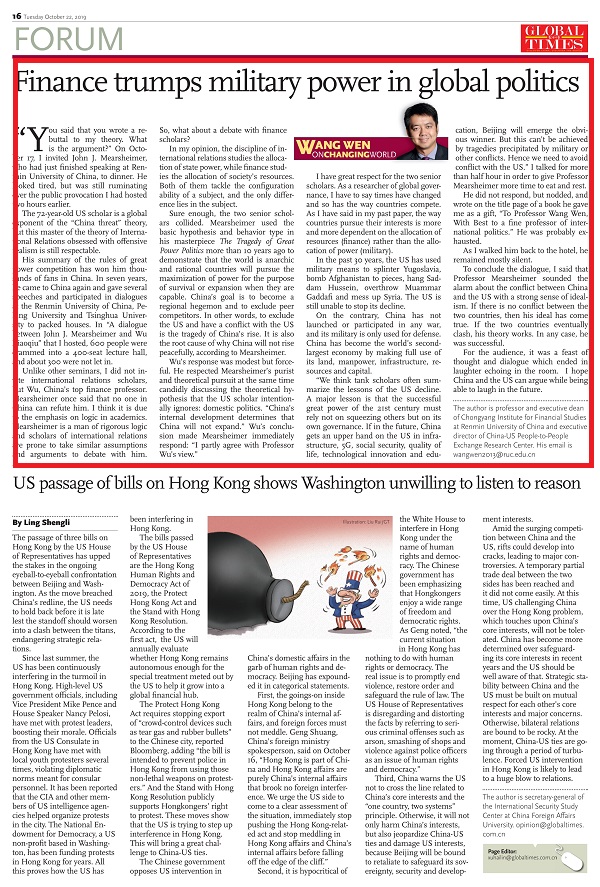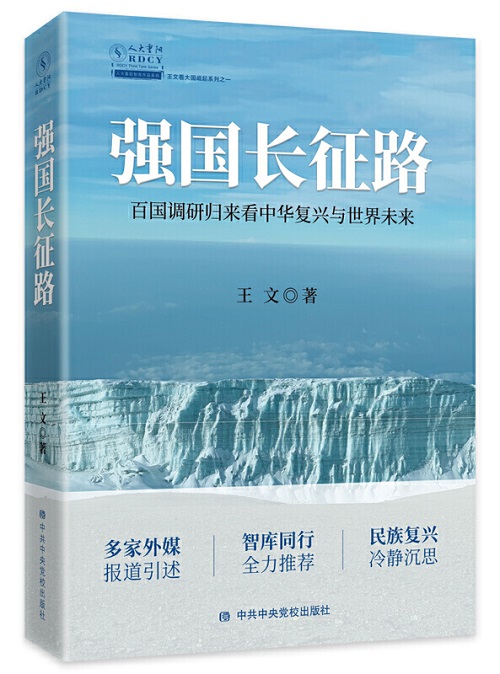Major Power Relations
Your Present Location: PROGRAMS> Major Power RelationsWang Wen: Finance trumps military power in global politics
By Wang Wen Source: Global Times Published: 2019-10-22

"You said that you wrote a rebuttal to my theory. What is the argument?" On October 17, I invited John J. Mearsheimer, who had just finished speaking at Renmin University of China, to dinner. He looked tired, but was still ruminating over the public provocation I had hosted two hours earlier.
The 72-year-old US scholar is a global exponent of the "China threat" theory, but this master of the theory of International Relations obsessed with offensive realism is still respectable.
His summary of the rules of great power competition has won him thousands of fans in China. In seven years, he came to China again and gave several speeches and participated in dialogues at the Renmin University of China, Peking University and Tsinghua University to packed houses. In "A dialogue between John J. Mearsheimer and Wu Xiaoqiu" that I hosted, 600 people were crammed into a 400-seat lecture hall, and about 300 were not let in.
Unlike other seminars, I did not invite international relations scholars, but Wu, China's top finance professor. Mearsheimer once said that no one in China can refute him. I think it is due to the emphasis on logic in academics. Mearsheimer is a man of rigorous logic and scholars of international relations are prone to take similar assumptions and arguments to debate with him. So, what about a debate with finance scholars?
In my opinion, the discipline of international relations studies the allocation of state power, while finance studies the allocation of society's resources. Both of them tackle the configuration ability of a subject, and the only difference lies in the subject.
Sure enough, the two senior scholars collided. Mearsheimer used the basic hypothesis and behavior type in his masterpiece The Tragedy of Great Power Politics more than 10 years ago to demonstrate that the world is anarchic and rational countries will pursue the maximization of power for the purpose of survival or expansion when they are capable. China's goal is to become a regional hegemon and to exclude peer competitors. In other words, to exclude the US and have a conflict with the US is the tragedy of China's rise. It is also the root cause of why China will not rise peacefully, according to Mearsheimer.
Wu's response was modest but forceful. He respected Mearsheimer's purist and theoretical pursuit at the same time candidly discussing the theoretical hypothesis that the US scholar intentionally ignores: domestic politics. "China's internal development determines that China will not expand." Wu's conclusion made Mearsheimer immediately respond: "I partly agree with Professor Wu's view."

I have great respect for the two senior scholars. As a researcher of global governance, I have to say times have changed and so has the way countries compete. As I have said in my past paper, the way countries pursue their interests is more and more dependent on the allocation of resources (finance) rather than the allocation of power (military).
In the past 30 years, the US has used military means to splinter Yugoslavia, bomb Afghanistan to pieces, hang Saddam Hussein, overthrow Muammar Gaddafi and mess up Syria. The US is still unable to stop its decline.
On the contrary, China has not launched or participated in any war, and its military is only used for defense. China has become the world's second-largest economy by making full use of its land, manpower, infrastructure, resources and capital.
"We think tank scholars often summarize the lessons of the US decline. A major lesson is that the successful great power of the 21st century must rely not on squeezing others but on its own governance. If in the future, China gets an upper hand on the US in infrastructure, 5G, social security, quality of life, technological innovation and education, Beijing will emerge the obvious winner. But this can't be achieved by tragedies precipitated by military or other conflicts. Hence we need to avoid conflict with the US." I talked for more than half hour in order to give Professor Mearsheimer more time to eat and rest.
He did not respond, but nodded, and wrote on the title page of a book he gave me as a gift, "To Professor Wang Wen, With Best to a fine professor of international politics." He was probably exhausted.
As I walked him back to the hotel, he remained mostly silent.
To conclude the dialogue, I said that Professor Mearsheimer sounded the alarm about the conflict between China and the US with a strong sense of idealism. If there is no conflict between the two countries, then his ideal has come true. If the two countries eventually clash, his theory works. In any case, he was successful.
For the audience, it was a feast of thought and dialogue which ended in laughter echoing in the room. I hope China and the US can argue while being able to laugh in the future.
The author is professor and executive dean of Chongyang Institute for Financial Studies, at Renmin University of China and executive director of China-US People-to-People Exchange Research Center. His new book Great Power's Long March Road was launched recently.
























































































 京公网安备 11010802037854号
京公网安备 11010802037854号





